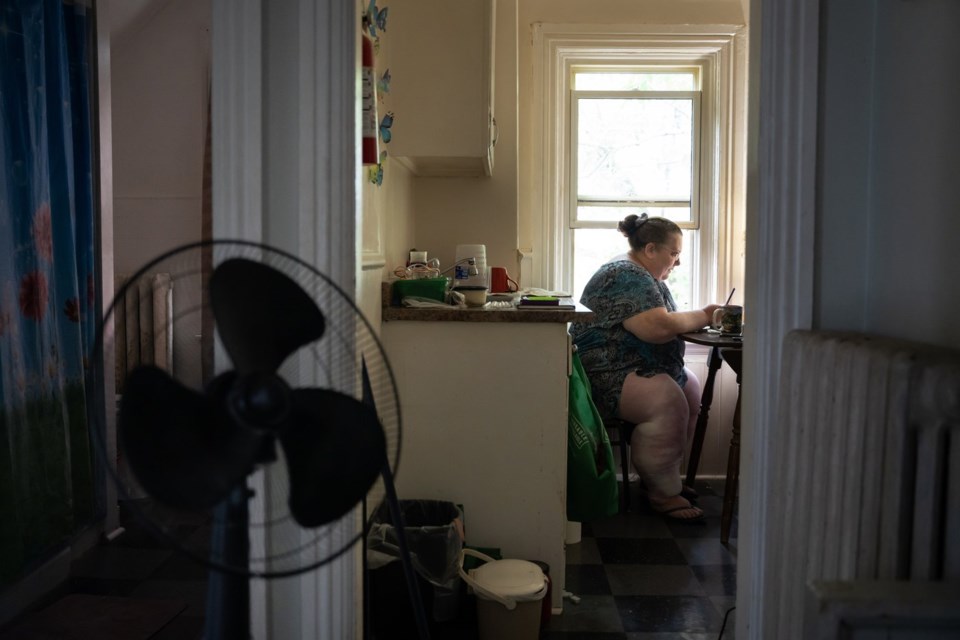HALIFAX — Sandra Walsh was struggling to breathe in her apartment when temperatures across Nova Scotia soared in July, but the woman on social assistance says her pleas for a government-funded air conditioner have been ignored.
"With the high humidity, it effects my breathing and I have to gasp for air," says the 46-year-old woman, recently diagnosed with a progressive lung disease. "Even taking frequent, cold showers isn't really helping."
The resident of New Glasgow, N.S., is among many low-income Canadians with health conditions struggling to get government help to stay cool. She wants to buy a $300 air conditioner, but that would leave her with little money for food or medications.
As of Wednesday, Walsh said it had been more than two months since she asked her income assistance caseworker for money to pay for an air conditioner. She said she has made the same request every summer since 2020, but has been refused.
Similar struggles over what advocates call the "right to cooling" are gaining attention across the country.
Renters' groups argue AC units are sometimes required to prevent illness and death, and some experts are calling for wider solutions that could include public cooling centres.
Last year, another resident of New Glasgow, Julie Leggett, won an appeal before an adjudicator who decided the province had to pay for air conditioner due to her chronic pain condition. But the ruling only applies to Leggett.
Nova Scotia's Department of Social Development said in a recent statement its policy of refusing to cover the cost of air conditioners for low-income people with health conditions has not changed.
"In situations where health risks are worsened by extreme heat, caseworkers may refer individuals to local charities such as St. Vincent de Paul or churches," a spokeswoman for the department said in an email.
Meanwhile, the province says Efficiency Nova Scotia — a non-profit energy conservation utility — can help landlords purchase heat pumps for affordable housing.
Leggett says these solutions aren't always available to people living in poverty. "The province should not be trying to push its legal obligations onto non-profits that are already maxed out," she wrote in an email.
In Ottawa, where temperatures soared in mid-July, 75-year-old apartment dweller Marie Lourdes Garnier said provincial governments should be helping low-income renters purchase air conditioners.
She said her apartment was stifling during a recent heat wave, adding that in recent weeks she's found herself growing faint despite continually splashing cold water on her head.
A spokesperson for the Ontario government said people on income assistance can apply for an air conditioner when municipal or First Nations programs permit it. In addition, people with disabilities can apply through the Ontario Disabilities Support Program. And the City of Toronto recently started offering a pilot program for low-income seniors.
Garnier, who lives on a small pension, isn't eligible for these programs because she is not receiving income assistance.
"It's very, very expensive for me ... (and) I'm not talking about (needing an AC unit) for comfort. It's a matter of life and death."
Last year, an advocacy group for low-income renters known as ACORN found that a "negligible proportion" of its membership received public funds to buy an air conditioner or heat pump. A majority of the 737 people who responded to a survey reported poor sleep, fatigue and headaches from excessive indoor heat.
In Moncton, N.B., Peter Jongeneelen — vice chair of ACORN New Brunswick — said that during a recent heat wave, he was admitted to an ER because he was suffering from heat exhaustion.
He said people living on disability pensions need help, "(but) there's no real programs out there in New Brunswick. It's something we would like to change."
Meanwhile, the number of people showing up at emergency rooms with heat-related problems continues to rise. Last month, Health Canada reported this type of case rose from about 600 in 2004 to about 1,100 in 2023.
In British Columbia, where a "heat dome" in the summer of 2021 caused 600 deaths, the province committed $30 million in 2023 for a free air conditioner program run by BC Hydro. Since then, about 27,500 free AC units have been installed, the utility said.
Still, University of British Columbia researcher Liv Yoon says the program has faced challenges. Some landlords, for example, have said their buildings simply can't support air conditioning.
Yoon, co-author of a report titled "A Right to Cool," said there's a need for public cooling centres and access to free public transit to reach them. The report also calls for creation of affordable housing that includes passive shade systems to reduce indoor heat.
Alex Boston, a B.C.-based urban planner and consultant, said air conditioners may be necessary for some low-income renters, but other solutions are often available.
Indoor temperatures can be lowered by using window shades and fans, he said in an interview. Simple shading and air movement can decrease indoor temperatures by as much as 10 C, he said.
In New Glasgow, Walsh said shades and fans might help.
"But a refusal (of assistance) would mean I would suffer and not be able to breath with the extreme heat, which can lead to death," she said.
This report by The Canadian Press was first published Aug. 6, 2025.
Michael Tutton, The Canadian Press



